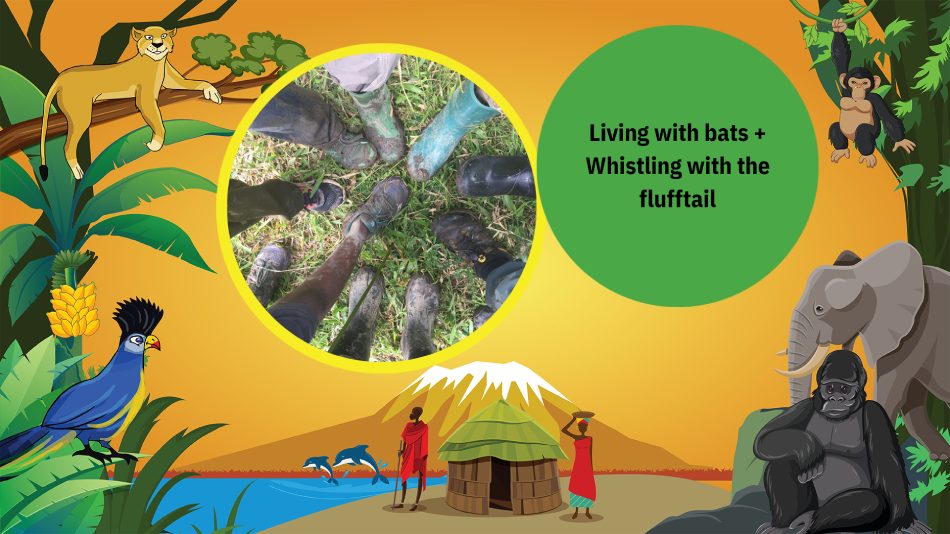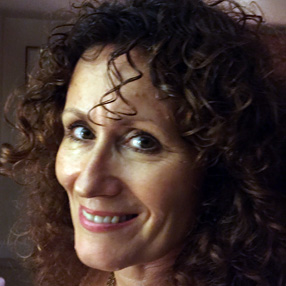Ep. 8 Living with bats + Whistling with the flufftail
[00:00:00] Charlotte: Hello, welcome to the East Africa Travel Podcast, inspired by my life living on the edge of Kibale National Park in Western Uganda.
[00:00:12] Welcome to my world. Can you hear it? My name is Charlotte Beauvoisin. I’m a conservationist and writer of Diary of a Muzungu. I also go by my local name, Nagawa.
[00:00:30] Welcome to episode 8 of the East Africa Travel Podcast.
[00:00:37] Hello again. I am back at Sunbird Hill. Just got back a couple of hours ago after a road trip with Jiri, the lodge manager at Turaco Treetops. Thank you Jiri for driving in that horrible weather. Lots of flooded roads and, but anyway, very little traffic so we did have the road to ourself most of the way from Kampala. Took us about six hours, I think.
[00:01:05] Jiri was one of the first people that I shared the podcast links with. He sent me a message the day I launched: “Charlotte, is the podcast available yet? Just thought about it. Must be me missing the forest, exclamation mark.”
[00:01:20] Well, you can’t beat that: somebody asking to listen to the podcast. And he wrote: “Listened to the trailer and the two first episodes. Love it. Cannot wait for more. Mum said she liked it too, to which I replied, you don’t speak any English!”
[00:01:37] Jiri and his family are from the Czech Republic.
[00:01:39] “She said she loved the sounds in the background and your voice. Now that’s feedback. Cannot wait to be at home listening to chimps,” he said, so that made my day.
[00:01:48] That was very nice, thank you. And thank you very much to all the various friends and colleagues who’ve been sending me their feedback about the first few episodes of the podcast.
[00:02:00] It’s gonna get dark soon.
[00:02:03] I always notice things like Ooh, the wooden shutters on the house are a little bit harder to open, which means the house has sunk another fraction of a millimetre.
[00:02:13] There was rain most of the way up from Kampala, and got to the forest to hear that it had been raining for six or seven hours. Everything is absolutely sodden. There’s water everywhere.
[00:02:23] We have Max here, sniffing. Max! Hello. You might be able to hear him walking around. Max howls sometimes. He’s very funny. He’s a very talkative dog. I’ve never met a dog that’s so talkative actually. But he does like to come and mark his territory. He might smell something on my bag, so I’ve just got to shut the gate, shut the door. I’ve got a wooden door. I live in a stable really, don’t I?
[00:02:53] Anyway, news from home. Been away two weeks. Spent quite a lot of time packing everything away because otherwise stuff gets eaten or goes mouldy on the edge of the forest. Hope has very kindly swept my house for me. I now know how much she hates bats so it was very sweet of her not to complain when I asked her to do it and she’s noticed that I now have four bats in my house.
[00:03:18] Two was really exciting because they hang / spend most of the day upside down right at the top of the roof inside the thatch. I’m looking at them now, can’t really see them, because it’s a bit dark and just hear the occasional squeak. Come about 6.30pm they’ll start flying in and out the house which is… it tickles me!
[00:03:38] They’re not at all interested in me. They just catch moths. Anyway, I came back a few weeks ago from a trip and I saw a third one and I thought two was fun. Hang on, three can become four, can become ten, can become a hundred and I really don’t want them taking over because it could get very noisy and smelly and I shouldn’t really live in the same environment as bats.
[00:04:02] Hmm, what to do? I don’t want to remove them. But I do have this mosquito repellent thing. It’s a solar powered repellent jobby. I got it to keep mosquitoes away. It’s really good. Very, very high pitched. Like that, but higher. Oh, the dog turned around then! Actually, this thing has a setting for mice and bats and cockroaches.
[00:04:26] If I put it on the bat setting, does it mean they’ll fly out and not fly back in again? I don’t know.
[00:04:32] Lovely to come back to the house that Hope has swept for me. Dogs were very pleased to see me and so I’ve got big dirty dog prints straight over the clean floor, but it was nice to have the attention.
[00:04:46] What else have I noticed? So far I’ve seen mangabey, baboons. Heard the chimps. Those are baboons. Don’t know if you can hear them from the forest.
[00:04:56] I’m going to go on a little walk and explore and see what else has changed. I’m going to put my wellies on. Here we go. Wooden steps looking pretty blinking treacherous and slippery. Holding on to the handrail.
[00:05:15] I am a red eyed dove. I am a red eyed dove.
[00:05:32] Oh, it’s such a lovely time of day. Cock a doodle doo!
[00:05:46] It’s so good to get back in daylight. Unpacked my bed, because it’ll smell all mushroomy, if I don’t put my duvet, my pillowcases away, I’ll come back to soft furnishings that smell of mushrooms. It can’t be too healthy to sleep under those, I guess.
[00:06:02] Hmm. Walking around the back of the house. Lots of termite damage here. Very worried about termites.
[00:06:09] Jiri did say to me earlier, There were people in Tanzania living in houses where the roof suddenly collapses. He said, you don’t know when it’s going to happen, it just happens. So that’s alarmed me.
[00:06:22] Oh, I can see an old bees nest on the side of the house. So I can see fairly recent termite activity. You see earth on the outside of a wooden post. And if you touch it, you might see the termites inside tunneling. They have been freshly destructive, if that makes sense.
[00:06:48] Oh, gawd. Yeah, they’ve absolutely munched the post, the fence. A couple of years ago we noticed that my house is sort of sinking to one side, so one of the carpenters put in some extra posts to try and stop the leaning. When I think about it now, it didn’t look like it was going to be that effective, more so when you see how the termites have eaten these extra supporting posts!
[00:07:21] I’m very happy to be back at my house though. It’s got personality.
[00:07:24] I’ve got a pair of sunbirds that must be nesting close to my house. They’ve been very active over the last few weeks and they love mirrors. I’ve got a big mirror next to my shower. A few times I’ve heard them pecking at their own reflection. One of them’s just looked at their reflection in another mirror outside the latrine.
[00:07:54] You can hear how happy I am to be back.
[00:07:59] Pair of sunbirds probably nesting, check.
[00:08:06] Great blue turacos up in the trees, check.
[00:08:13] Don’t know whether you can hear them. There are several of them in the trees around the house.
[00:08:23] It’s the lead coloured flycatcher.
[00:08:28] It’s been raining most of the day, Hope said. From seven in the morning until about three. There’s a little bit of sun coming through, that’s why everyone, everything, is getting a quick blast of activity.
[00:08:51] Oh, hello! Oh, is that for me? That welcome? Dogs come running, normally a sign that baboons are entering the compound somehow, somewhere.
[00:09:05] Let’s go for a walk.
[00:09:11] You’re going to have to put up with my noisy gumboots today.
[00:09:34] Weavers!
[00:09:36] Oh! I’ve never seen weaver birds nesting here in the tree next to the kitchen. Two black and white casqued hornbills just flew over. Oh, I can’t believe it. Oh, it’s so pretty! Very plain weaver. Basically black with a little yellow eye. But you can’t fail to notice their nests which are woven. And these are very round nests well, oval. Some weaver bird nests are oval. The nests are longer, sort of like tubes. Oh, how pretty. And the evening sunlight is just lighting them up. Ooh. Weaver birds.
[00:10:29] The male weaver bird weaves the nest out of a long piece of grass, and then the female inspects it. And if it’s not good enough, she’ll have to make a brand new one. I wonder how many nests he has to make before she gives it the go ahead, because you look at a tree, sometimes, that’s full of weaver birds nests. They’re big and very visible. So I wonder if you see a hundred nests, how many birds are in there? Such are the things I ponder as I go on my walk.
[00:10:59] Just listen to it.
[00:11:02] This is a pretty little green tunnel. We have elephant grass that’s about three metres high, or four next to the fence that goes around the family compound. And it’s kind of growing over so it’s a lovely green tunnel.
[00:11:38] Oh, I needed to walk, sitting in the car for all those hours.
[00:11:55] I’ve just seen a francolin. You don’t see them very often. It’s like a partridge or
[00:12:10] Oh! Frogs!
[00:12:32] Isn’t it a beautiful sound, that frog noise?
[00:12:39] God, the pond is almost overflowing. I haven’t seen the water this high in years. Often you walk up to the pond and you see the frogs sort of hanging there, suspended, and they’ve got all four legs sticking out. Suspended in the middle of the water. Not at the surface, not at the bottom. And there can be 20 or 30 of them. And of course they, when they see me, they tend to rush and hide.
[00:13:28] There’s been so much rain, something’s happened to affect them. I don’t know where they’ve gone. It’s a seasonal thing. I’m going to have to ask the Sunbird Hill Boys when I see them.
[00:13:43] So this is where I am. I am back at Sunbird Hill. I’m at the Birders Lounge, just walking down to the forest edge. The Birders Lounge is our huge open thatched area that’s got the reference library, so if you’re into your birds or your butterflies, there’s a whole shelf dedicated to each. We have all kinds of books here, and comfy chairs, and a life size chimpanzee carved out of wood.
[00:14:07] And the best part is the fantastic view into the forest.
[00:14:12] Well I’m waffling on, and it’s going to get dark soon.
[00:14:15] hear these big leaves. Oh God, I’m not good with plant names. Five metres tall. Listen to the sound of the leaves. Beautiful. Oh, there’s a lovely smell. Some flowers. Can’t see them. I wonder if they’re in the canopy.
[00:14:36] Hmm. That’s intriguing.
[00:14:41] That’s a great blue Turaco, crashing through the trees. It’s Turaco o’clock. It’s the call for the sundowners: oi! Stop work. Have a drink. It’s about half past six now, and it will suddenly get dark here on the equator. It gets dark here more quickly than it does in other parts of the world.
[00:15:09] Don’t know what I’m seeing, but there are marks of an animal. It’s slipped, or skidded. A non human animal has come across this path quite recently, since the rain. Hmm, some kind of antelope. I can smell a monkey. I assume it’s a monkey, but maybe it’s this antelope. It’s passed by here recently.
[00:15:41] It’s so good to be back. I know I’ve said it three times already, but it is. It’s particularly great to be back knowing that I’ve launched the podcast and that people have been enjoying the first few episodes. It’s suddenly all starting to make sense. An imposter no more. He he he.
[00:16:04] I’ve been telling people I’m launching a podcast for the longest time.
[00:16:10] I am a podcaster.
[00:16:18] You are listening to the East Africa Travel Podcast with me, Charlotte Beauvoisin, author of Diary of a Muzungu, which is my blog that I started in 2008.
[00:16:37] Ah, the forest looks lovely. Just this evening mist. Little bit of sunshine.
[00:16:48] White spotted flufftail.
[00:16:56] That is a very shy bird. It’s another swamp bird. It replied!
[00:17:28] Let’s go closer.
[00:17:36] Oh, trees collapsed here. It’s very muddy. Just climbing over some massive tree roots. It actually looks like the trunk of a tree. It’s so big. Lots of tiny little figs. Not, not edible by you or I, but we do get chimps up this particular tree.
[00:18:36] Did you hear it?
[00:19:44] I’m having the best time.
[00:20:31] Nearly lost my welly!
[00:20:42] I might be scaring the white spotted flufftail.
[00:21:05] Thanks for being with me on my evening walk. It’s great to have company.
[00:21:12] You’re listening to the East Africa Travel Podcast. hosted by me, Charlotte Beauvoisin, author of Diary of a Muzungu. Thanks for tuning in.
[00:21:24] If you’re listening on Diary of a Muzungu, I’d love you to sign up to the email newsletter, then you’ll get an alert every week for the new episodes.
[00:21:30] If you’re listening on Apple Podcasts, please click follow. I’d love you to give us a review as well. And please tell your friends all about the East Africa Travel Podcast and get in touch. Tell me what you think about the podcast. What kind of stories do you want more of?
[00:21:43] Till next time!
Tune to The East Africa Travel Podcast for the dawn chorus, travel advice, chats with award-winning conservationists, safari guides, travellers (and wacky guidebook writers!)
- Sign up to my newsletter.
- Follow on Apple, Spotify & all podcast directories.
- Follow Charlotte Beauvoisin, Diary of a Muzungu on Instagram, Facebook, LinkedIn and Twitter.
- Got a question, I’d love to hear from you!
- Send an email or a voice note.
Stay tuned for more sounds from the jungle!
Today we’re back on the edge of Kibale National Park, stretching our legs after a long road journey from Kampala, Uganda’s capital. The air is alive with song as the birds catch the last rays of afternoon sunshine after a day of heavy rain. Join me for a duet with the rare white-spotted flufftail and find out:
- What friends and colleagues are saying about the first episodes of the East Africa Travel Podcast?
- What’s been happening in my wooden house while I’ve been away?
- And, more to the point, who (or what) is eating my house?
Come with me – Charlotte Beauvoisin, author of Diary of a Muzungu – as I don my gum boots for a quick yomp through the muddy swamp at Sunbird Hill, Kibale Forest, Uganda!
Scroll down for the full transcript of this week’s episode.
Tune to The East Africa Travel Podcast for the dawn chorus, travel advice, chats with award-winning conservationists, safari guides, travellers (and wacky guidebook writers!)
- Sign up to my newsletter.
- Follow on Apple, Spotify & all podcast directories.
- Follow Charlotte Beauvoisin, Diary of a Muzungu on Instagram, Facebook, LinkedIn and Twitter.
- Got a question, I’d love to hear from you!
- Send an email or a voice note.
Stay tuned for more sounds from the jungle!














